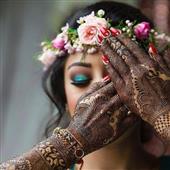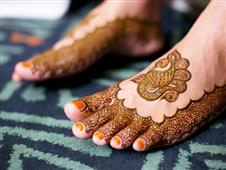Henna Tattoo St Louis
- Saint Charles, MO
- 15 Years in Business
- By Appointment

“Sulekha /Trusted” indicates that the identity & information of the vendors/services, viz., name, address, contact details, business name has been verified on best effort basis, as existing, based on the documents/information furnished by the vendors/service providers. "Sulekha Trusted Stamp" are also allocated to the vendors/service providers considering user's reviews/ratings or any other criteria.
Sulekha strongly recommends to its users/callers to verify all relevant details of vendors/services before availing any products/services from them. Sulekha does not implicitly or explicitly endorse any product/s or services provided by the vendors/service providers.
The Sulekha Verified status confirms that a business's name, address, and contact details were accurate at the time of registration, based on submitted documents or call details. We recommend users exercise caution and conduct due diligence before using any services. Sulekha does not endorse any offerings from advertisers or service providers. For more information, please refer to our Terms and Conditions.
15 Years
Suman
Henna, also commonly referred to as mehndi, is a paste prepared from a plant and used to dye skin, hair, nails, and fabrics in different regions such as the Arabian Peninsula, Indian subcontinent, North Africa and more. Henna has been used as decoration on young women's bodies as part of social events such as weddings and holidays. This is the origin of the Henna Night in the Middle East, Mediterranean, Africa, and India which is an evening prior to a woman's wedding in which her and her family and friends are adorned with the paste. Given the climate of these specific regions, henna has also been used as a way to relieve heat from these hot, dry locations - wearers of henna can experience their hands getting colder after application. In modern times, and with the expansion to use in America, henna is now used as form of recreational body art and entertainment. We ONLY use natural henna. You can tell natural henna based on the color and texture once applied. Natural henna is green in color, dries and hardens above the skin (doesn't sink in to skin), and leaves an orange, reddish, or brown stain. With increase in popularity, there is also an increase in henna-like products such as jagua, or black henna, which may contain unlisted dyes and chemicals to produce a black stain, instead of the natural red or brownish color. People with a glucose-6-phosphate dehydrogenase deficiency (G6PD deficiency) or other allergies should avoid applying any henna on their hair, skin, or nails or they may suffer from allergic reactions.
Rated 5.0 I highly recommend Henna Tattoo! The ladies were super professional and responsive. I love how accommodating they were. My daughter and her friends had a blast getting henna designs. Definitely a way to make a special day memorable.

Indian weddings have their special own rituals and culture which is being followed for centuries, one of them is mehendi cer...
Continue reading
Henna is a medicinal herb that relieves the body from stress and releases tension. It is used for small burns, cuts or scrat...
Continue reading
Indian or South Asian weddings are quite a grand and elaborate affair stretching up to three or four days. A mehendi night i...
Continue reading1303 Magnolia Manor Ct, Saint Peters, Missouri, USA
